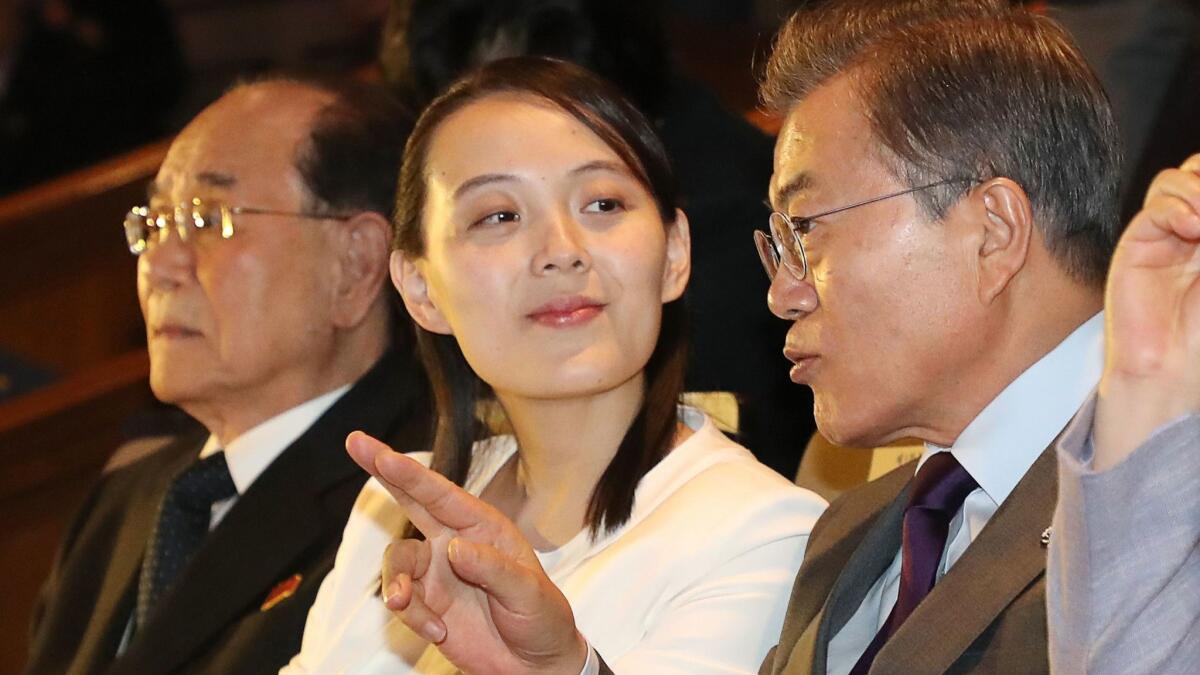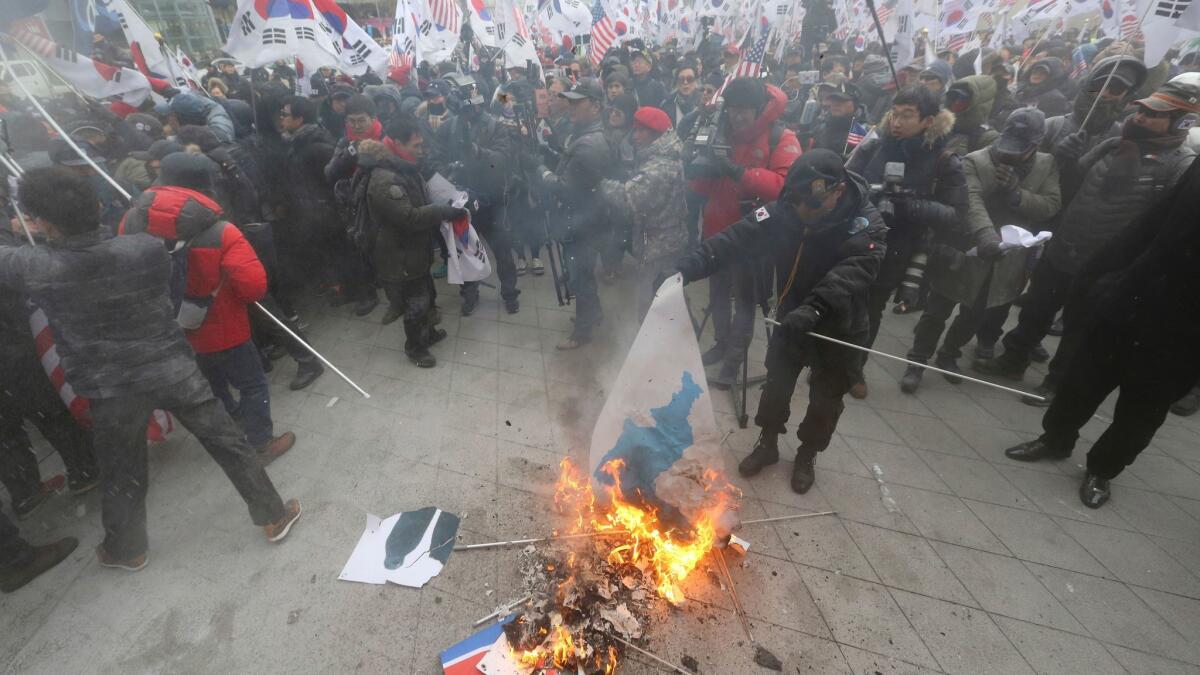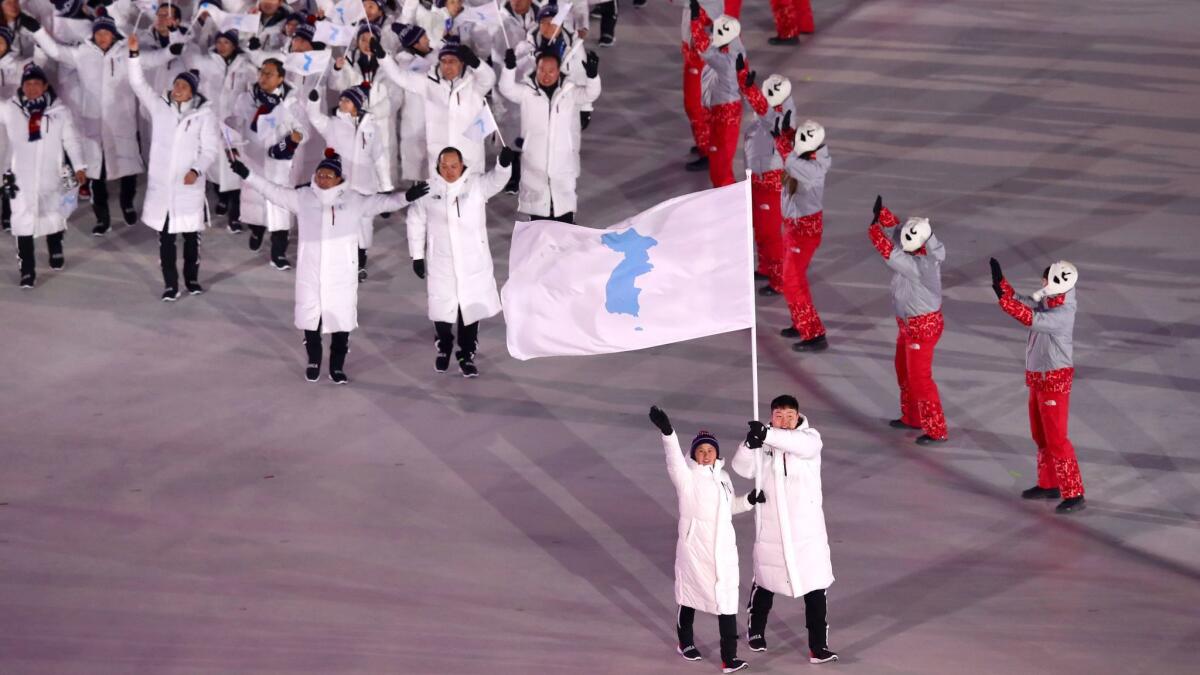Can Winter Olympics momentum bring true diplomacy for North and South Korea?

- Share via
Reporting from Seoul — South Korean President Moon Jae-in could someday soon make a historic trek to Pyongyang for a summit with North Korean leader Kim Jong Un, a meeting made possible by recent diplomacy at the Winter Olympics.
But that would only happen after the parties first “set the conditions,” the South Korean government reiterated Monday. The phrase indicates a desire for the North to accept some discussion of its nuclear program, and perhaps schedule talks with Seoul’s key ally, the United States.
The conditions for Moon aren’t quite set, either.
The president remains relatively popular, with a roughly 60% approval rating, after winning election in May with just a plurality of the vote — in a campaign defined in part by his openness to engage in dialogue with the North. Yet many South Koreans — not to mention regional security partners in Washington and Tokyo — question whether pursuing such a bold diplomatic move with the North right now is wise.
“It’s a democracy, and you have to lay the groundwork,” said Robert Kelly, a political science professor at Pusan National University who blogs about security issues. “He’s got to sell it to skeptical constituencies.”

That process began after the summit offer Saturday by a high-level delegation visiting the South for the Games and continued Monday as the agency charged with inter-Korean relations, the Ministry of Unification, released a memo outlining the government’s position.
The document, which also acknowledges that the president’s full-throated embrace of Olympics diplomacy was met with concern by many South Koreans, suggests a delicate path forward to any top-level dialogue.
In outlining its position, the Moon government noted, for example, that for years no progress has been made in curbing the North’s nuclear and ballistic missile programs, despite sanctions by the international community.
But it stressed a desire to pursue diplomatic progress while also remembering the concerns held by its regional security partners, including Japan and the United States.
Any meeting between Moon and Kim, who recently boasted that his nuclear-armed nation can now strike the United States, would be the first of its kind in more than a decade.
The offer came from a delegation that included Kim Yong Nam, the North’s ceremonial head of state, and Kim Yo Jong, a party official who is Kim Jong Un’s sister.
The document said progress in the meantime could still be made on issues in which Washington and Tokyo aren’t direct players, such as humanitarian aid or reunions for families separated by the Korean War.
The breakthrough on the Olympics — which included a joint march during the opening ceremony, a combined women’s hockey team and the delegation’s visit — came just six weeks ago. That’s when Kim Jong Un, delivering a New Year’s Day speech, said North Korea would like to participate in the Games and resolve tensions on the peninsula.

The address came after an especially active year of the North’s provocations — multiple long-range missile tests and an underground nuclear detonation — that at times seemed destined to provoke an armed conflict with the United States.
Vice President Mike Pence, in South Korea for the Olympics, sought to remind the world about the North’s nuclear behavior and dismal human rights record. President Trump has yet to weigh in, perhaps a sign that Washington is giving Moon some leeway to explore talks.
A key looming roadblock to the recent goodwill between the Koreas could surface in March, after the end of the Games, which include the later Paralympics. That’s when the United States, which has 28,000 troops in South Korea, could seek to conduct its annual war exercises with the South. They were delayed for the Olympics.
Moon recently pushed back against Japanese pressure to resume the war drills, telling Prime Minister Shinzo Abe over the weekend that the issue involves the South’s sovereignty. Japan has been rattled by North Korean missiles landing in its commercial shipping and fishing zone.
Jeff Kingston, an Asian studies professor at Temple University’s campus in Tokyo, described relations between Japan and South Korea as “somewhere between frosty and cold.”
The two nations have cooperated on regional security issues and trade, but they still have a thorny territorial dispute over a group of islets in the Sea of Japan, which South Koreans call the East Sea. They also disagree on how to resolve lingering enmity about the treatment of South Korean women during Japanese occupation before World War II.
“The disputes on how to handle North Korea are amplifying the long-standing tensions,” he said.
The exercises, historically seen by the North as an invasion rehearsal, are a recurring source of anger from Pyongyang. It remains unclear when they might occur this year, or whether delaying them or reducing their scale might be possible.
Any concession related to the military drills — an annual practice for decades — will probably face skepticism domestically among Moon’s conservative critics, not just Washington and Tokyo.
That’s perhaps one reason why Moon has remained circumspect about any summit conditions and the issue of denuclearization, which his government still supports, while also urging the North to consider dialogue with the United States.
Many regional security experts believe Kim Jong Un, who sought the nuclear program to ensure his nation’s security, is unlikely to abandon his weapons. So the Moon government suggested a slightly more subtle, if vague, goal — “certain progress to set the conditions for denuclearization,” according to the memo.
In the meantime, some believe the summit could be a starting point for approaching the nuclear question. Otherwise, the momentum for talks might fade.
“You’ve got to get these channels open so you can advance your interests,” said John Delury, an associate professor of Chinese studies at Seoul’s Yonsei University who follows inter-Korean issues closely.
It’s a pursuit made even more complicated by popular pressure on the South Korean government to remain transparent and accountable to the people after discontent over the leadership of Moon’s predecessor, Park Geun-hye, led to her impeachment and ouster last year.
“He’s got to deal with the most opaque, autocratic government in the world, but they’re committed to doing that,” Delury said. “It’s fascinating to watch.”
ALSO
North Korean leader proposes first Korean summit in a decade
Pence urges North Korea to abandon ‘long pattern of deception’ in its quest for nuclear arms
Stiles is a special correspondent.
More to Read
Sign up for Essential California
The most important California stories and recommendations in your inbox every morning.
You may occasionally receive promotional content from the Los Angeles Times.











